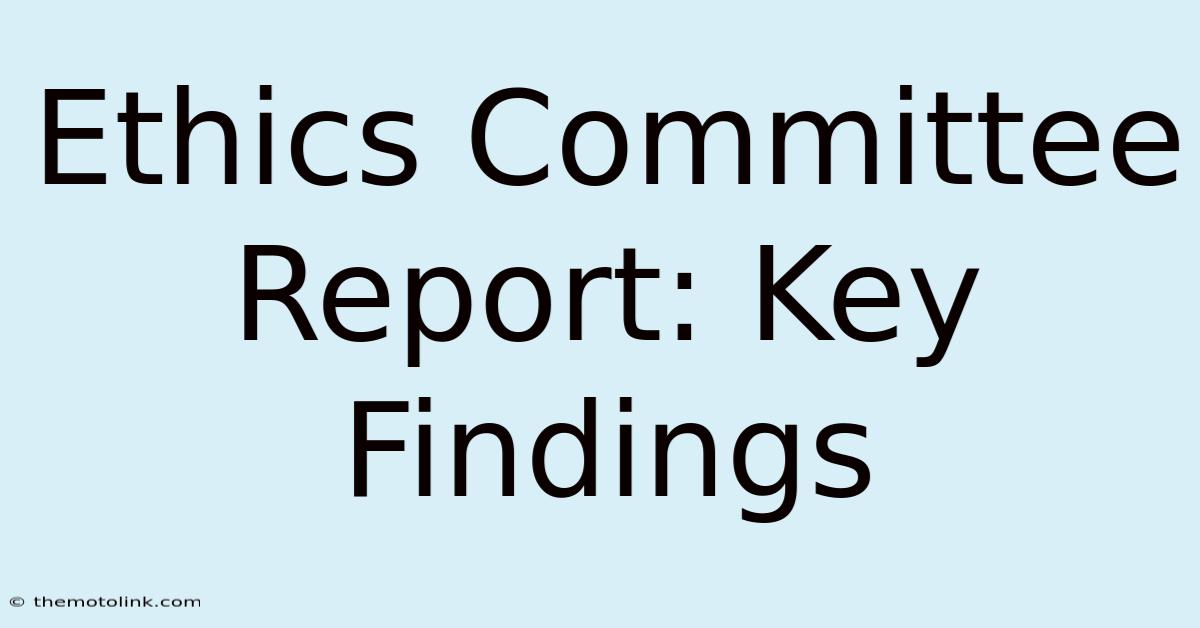Ethics Committee Report: Key Findings

Discover more detailed and exciting information on our website. Click the link below to start your adventure: Visit Best Website nimila.me. Don't miss out!
Table of Contents
Ethics Committee Report: Key Findings – Navigating the Complexities of Modern Ethical Dilemmas
Did you know that 80% of organizations experience at least one significant ethical dilemma annually? This startling statistic highlights the crucial role of ethics committees in navigating the increasingly complex moral landscape of modern businesses and institutions. This article delves into the key findings typically presented in ethics committee reports, offering insights into their function and importance.
The Importance of Ethics Committees: A Necessary Safeguard
Ethics committees are essential for organizations of all sizes. They serve as a crucial safeguard, providing a structured process for addressing ethical dilemmas and promoting a culture of integrity. Their role extends beyond simple compliance; they proactively identify potential conflicts, analyze risks, and offer recommendations for ethical decision-making. This proactive approach fosters a more trustworthy and responsible organization, minimizing reputational damage and legal liabilities.
Key Findings Commonly Found in Ethics Committee Reports: A Detailed Analysis
1. Prevalence of Specific Ethical Concerns: Ethics committee reports often highlight the most prevalent ethical issues faced by the organization. These might include conflicts of interest, data privacy violations, workplace harassment, financial irregularities, or environmental concerns. For example, a report might indicate a significant increase in reported cases of workplace bullying, necessitating further investigation and the implementation of preventative measures. Analyzing these trends helps prioritize resources and develop targeted training programs.
- Example: A recent report from a large tech company highlighted a surge in concerns regarding algorithmic bias in their recruitment process, leading to a complete overhaul of their AI-driven recruitment tools.
2. Effectiveness of Existing Policies and Procedures: A core function of the ethics committee is to assess the effectiveness of the organization's existing ethical guidelines and procedures. Reports frequently evaluate the clarity, accessibility, and enforcement of these policies. They might identify gaps in the current framework, recommending improvements for greater clarity and compliance.
- Example: An ethics committee might find that the existing whistleblower protection policy is insufficiently publicized, leading to a recommendation for more proactive communication and training on reporting procedures. This could include the creation of easily accessible online resources and mandatory annual training sessions.
3. Recommendations for Improvement: Based on their analysis, ethics committees offer actionable recommendations for improving ethical conduct within the organization. These recommendations can range from implementing new policies and procedures to enhancing training programs, improving communication channels, or strengthening accountability mechanisms.
- Example: A report may recommend the implementation of a mandatory ethics training module for all new employees, focusing on specific areas of concern identified during the reporting period. Further, it might suggest the creation of an anonymous reporting system accessible through a dedicated webpage and mobile application.
4. Case Studies and Best Practices: Many ethics committee reports include detailed case studies illustrating specific ethical dilemmas encountered and the committee's approach to resolution. These case studies serve as valuable learning tools, highlighting both successful resolutions and areas where improvement is needed. They often feature examples of best practices in ethical decision-making and conflict resolution.
- Example: A detailed case study might describe a situation where a conflict of interest was identified and the steps taken to mitigate the risk, illustrating the practical application of the organization's ethical guidelines.
5. Future Trends and Emerging Ethical Challenges: Progressive ethics committees anticipate future challenges and emerging ethical issues relevant to the organization's activities and industry. This forward-looking perspective allows for proactive planning and mitigation strategies.
- Example: An ethics committee report might discuss the potential ethical implications of artificial intelligence within the organization, recommending the development of guidelines specific to AI-related projects.
Conclusion: Building a Culture of Ethical Responsibility
Ethics committee reports are invaluable tools for promoting ethical conduct and accountability within organizations. By highlighting prevalent ethical concerns, evaluating existing policies, and providing practical recommendations, these reports contribute to building a culture of integrity and responsible decision-making. What strategies does your organization employ to foster ethical behavior? Share your thoughts below!
Meta Description: Understand the key findings typically included in ethics committee reports. Learn about prevalent ethical concerns, policy effectiveness evaluations, and recommendations for improvement. Enhance your organization's ethical culture.
Image Suggestions:
- A diverse group of people collaborating around a table, representing an ethics committee.
- An infographic illustrating the most common ethical dilemmas faced by organizations.
- A graph showing the effectiveness of ethics training programs over time.
FAQs (with suggested schema markup):
- Q: What is an ethics committee? (Schema: FAQPage) A: An ethics committee is a group responsible for reviewing and addressing ethical dilemmas within an organization.
- Q: How often are ethics committee reports issued? (Schema: FAQPage) A: The frequency of reporting varies, but it’s often annually or semi-annually.
- Q: Who typically sits on an ethics committee? (Schema: FAQPage) A: Membership usually includes individuals with diverse expertise, including legal, HR, and senior management representatives.
(Note: Remember to replace the examples with real-world examples relevant to the specific organization and its context.)

Thank you for visiting our website wich cover about Ethics Committee Report: Key Findings. We hope the information provided has been useful to you. Feel free to contact us if you have any questions or need further assistance. See you next time and dont miss to bookmark.
Featured Posts
-
Fantasy Football Jacobs 107 Yard Game
Dec 24, 2024
-
2024s Best Primetime Moments High 5
Dec 24, 2024
-
Jacobs 53 Rushing Yards Packers Lead
Dec 24, 2024
-
Clinton Hospitalized Recovering Well
Dec 24, 2024
-
Packers 14 0 Jacobs Rushing Td
Dec 24, 2024
